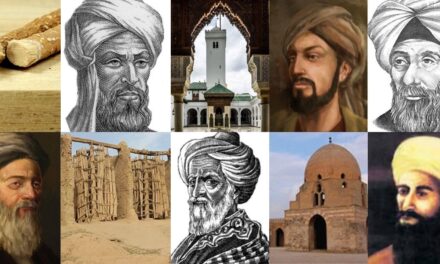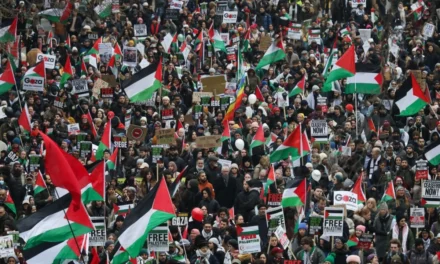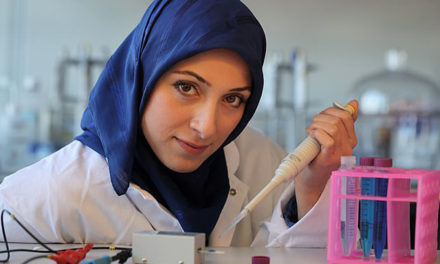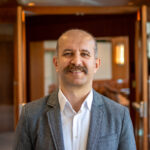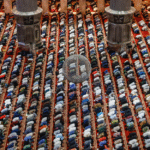Rabbi David Saperstein, from left, Pastor Bob Roberts Jr. and Imam Mohammed Magid speak during the Global Faith Forum at Northwood Church in Keller, Texas, March 6, 2022. Photo courtesy of MFNN
KELLER, Texas (RNS) — On Sunday evening (March 6) inside Northwood Church, an evangelical megachurch in a Dallas suburb resembling a tasteful convention center, the sanctuary’s stadium seating was filling up as three clergymen warmed up the crowd with (genuinely funny) jokes.
Those gathered at Northwood were not, however, evangelicals awaiting the start of an evangelical service. Instead, kippahs, skull caps and hijab adorned the heads of the assembly as Jews and Muslims sat alongside Christians and members of other faiths. The three men at the front engaged in friendly mutual ribbing were Rabbi David Saperstein, Imam Mohammed Magid and Pastor Bob Roberts.
Together the trio leads the Multi-Faith Neighbors Network and had convened the gathering at Northwood for a two-day event kicking off a new effort called the Global Faith Forum.
In a time of polarization that’s tearing America apart, the forum aims to bring together prominent voices from Christian, Jewish and Muslim communities to build cooperation between people of different faiths. Sunday night in Texas, the several-hundred participants learned about the possibilities of interfaith and multi-faith peace and how to become interfaith leaders themselves.
On hand were what can only be called interfaith dignitaries: Saperstein, who served as President Obama’s ambassador for international religious freedom, was joined by his successor, Sam Brownback, and the current ambassador, Rashad Hussain.
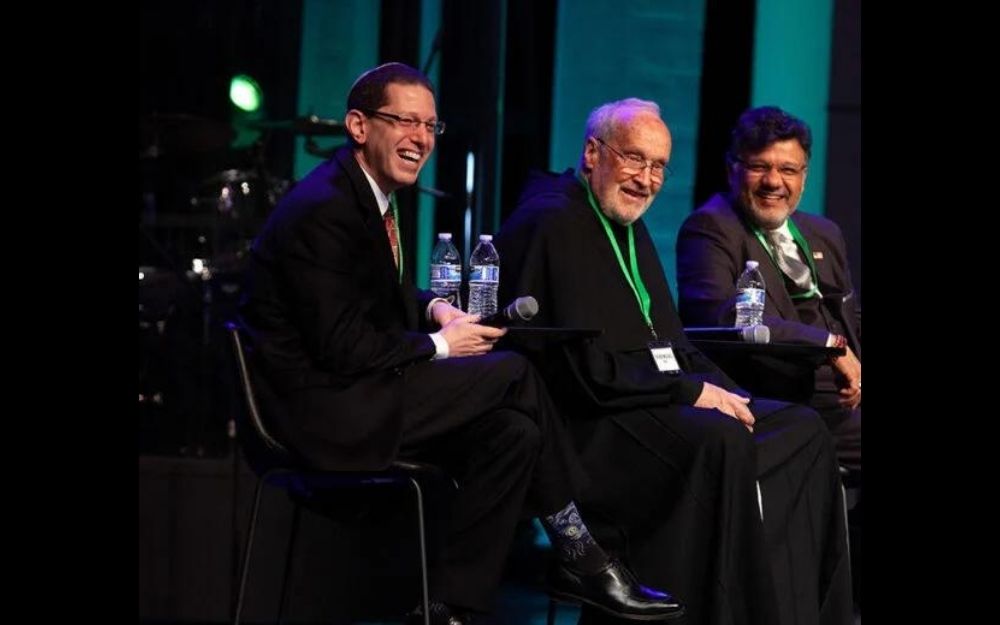
Rabbi Charlie Cytron-Walker, left, participates in the Global Faith Forum at Northwood Church in Keller, Texas, March 7, 2022. Photo courtesy of MFNN
Rabbi Charlie Cytron-Walker, who only a couple weeks before had been taken hostage at the synagogue in nearby Colleyville, was honored and received a standing ovation, flanked by the local religious leaders who had supported his family during the ordeal.
But the leaders of the project by turns testified that interfaith work begins with a moment of revelation that’s less about celebrity than humility.
Roberts confessed that he had never really talked to a Muslim before he was invited several years ago to do humanitarian work in Afghanistan.
“I met this warlord in Afghanistan and for some reason there was a connection between us, and he showed me around Afghanistan,” said Roberts. “I thought to myself, I’m with the baddest of the bad Muslims, and he has become my friend. I’ve got this all wrong. While I thought I saw God right, or as well as anyone can, I wasn’t seeing people right.”
The experience led him to bring evangelical pastors from Texas to Afghanistan and connect them with local imams to build schools and clinics. That effort brought him into contact with Magid, imam of the All Dulles Area Muslim Society in Virginia and a former president of the Islamic Society of North America.
Magid, who grew up in Sudan, told the crowd at Northwood that he had not met anyone who was not Muslim until he came to the United States to accompany his father, who needed surgery. “There I met a Christian, and Jewish and Muslim doctors, working together to care for my father.”
Magid described meeting Roberts as a turning point: “I was watching him and saw that this guy is restless, he wants to do something. Talking about it is not enough.”
Magid found that he could trust Roberts — another essential building block for interfaith cooperation, he said. “Trust is everything in the relationship. When you trust the person then you are willing to take risk with them.”
Trust for Magid is not a vague feel-good word. “Trust is a delicate issue among evangelicals and Muslims,” he said. “Muslims question me about working with evangelicals, and people walk out of (Roberts’) church because they don’t trust us. People call us naïve.”
Magid and Roberts said some of the fiercest challenges to interfaith work can come from people within their own community. “The biggest challenge is your own tribe; they come after you.”
Saperstein agreed, saying, “The battle for the hearts and minds of people, very often that battle has to be fought within each community.”
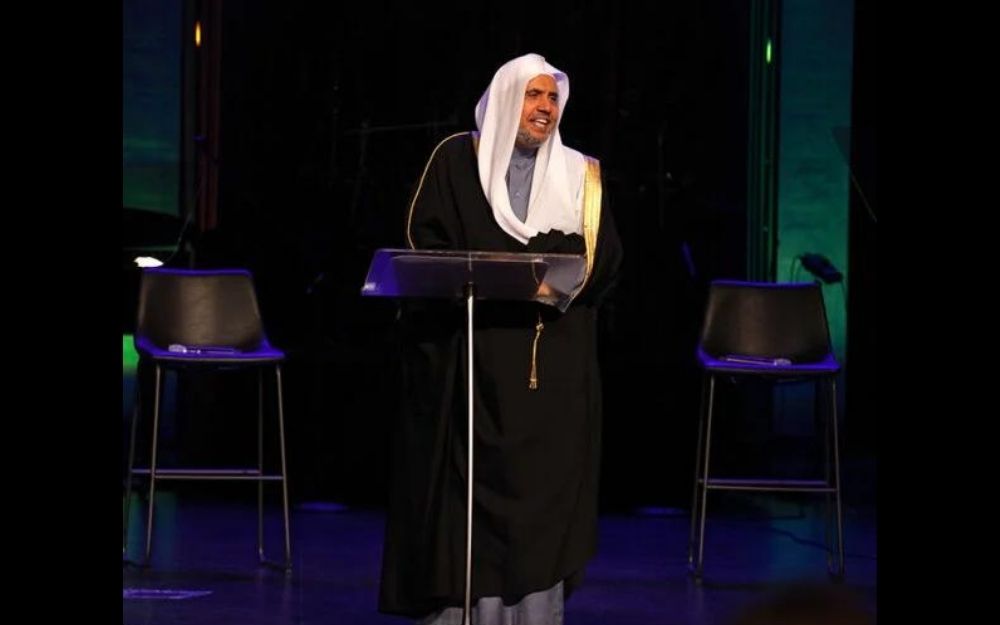
Mohammad Al-Issa, secretary general of the Muslim World League, speaks at the Global Faith Forum at Northwood Church in Keller, Texas, March 6, 2022. Photo courtesy of MFNN
Mohammad Al-Issa, secretary general of the Muslim World League, who was the night’s keynote speaker, told of leading a delegation of prominent Muslim leaders two years ago to Auschwitz for the observance of the 75th anniversary of the liberation of the camp. The visit, he said, was not popular among all Muslims.
When asked about how he had the bravery to visit Auschwitz in the face of criticism, he demurred: “The source of my courage is faith. There was a crime committed in Auschwitz. The Jewish people were oppressed, and I had to go there to make it clear to the Muslim world that what happened was wrong. It did not require courage; it was a religious obligation. If I did not go, it would be wrong.”
Al-Issa, who spoke in Arabic, appeared at the Global Faith Forum to present the Charter of Makkah, a groundbreaking consensus document produced in 2019 by a consortium of Muslims from 139 Muslim countries and across several Muslim sects. The charter describes its aims as ‘the promotion of moderate Islam’ and begins with this first point: “All people, regardless of their different ethnicities, races and nationalities are equal under God.”
One of the themes of the Global Faith Forum is “unlikely” — the unlikeliness that leaders so deeply committed to their own faiths and separated by such cultural and religious differences would come together as allies in mutual understanding.
After Al-Issa spoke, Brownback invited the crowd to consider how remarkable — how unlikely — it was to sit in an evangelical church in Texas to hear an international Muslim leader address a multi-faith audience in his own language.
No less unlikely was Al-Issa’s answer when I asked him the next day what people of all faiths, deep in the heart of Texas, could do to support his work. The secretary general of the Muslim League paused, smiled and said: “Pray for us. We always need your prayers.”
(Paul Brandeis Raushenbush is senior adviser for public affairs at Interfaith Youth Core. The views expressed in this commentary do not necessarily reflect those of Religion News Service.)
By Paul Brandeis Raushenbush

